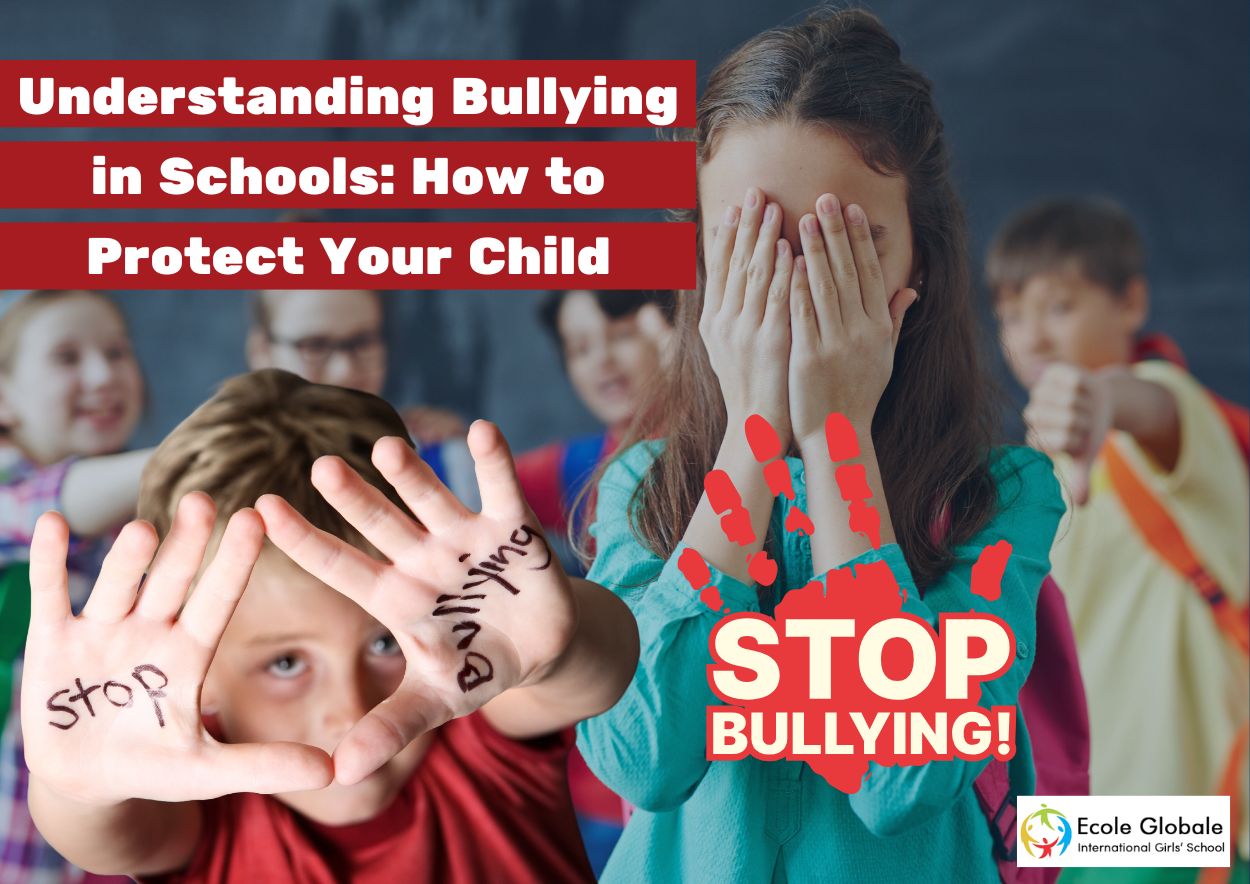Did you know that 15.5% of high school students experience cyberbullying? Discover how to protect your child from this growing issue.
In today’s digital age, cyberbullying has become a prevalent concern affecting many adolescents. With nearly 1 in 6 high school students in India encountering cyberbullying, it’s crucial for parents to understand how to safeguard their children from this pervasive threat. Learn proactive strategies and practical steps to create a safe online environment for your child, ensuring they navigate the digital world with confidence and security. Here are some types of bullying in School parents should know.
Types of Bullying in School Parents Should Know About

Parents need to be aware of the various forms of bullying in school to help protect their children. Direct bullying combines both verbal and physical abuse. This can involve hurtful spoken comments or written messages that emotionally damage a student, as well as physical harm to the student or their possessions. For example, hitting a student while calling them rude names or using foul language is a form of direct bullying.
Indirect bullying is primarily verbal and occurs frequently in schools. One common example is when a student spreads false information about another student to cause humiliation.
With the rise of technology, bullying has also moved online. Cyberbullying happens when students use email or social media platforms like Facebook to post harmful content. Did you know that a 2015 Centers for Disease Control study found that 15.5% of high school students and 24% of middle schoolers experience cyberbullying? A common form of cyberbullying includes sharing a student’s private photos or videos without their consent. This kind of bullying is particularly insidious because it often takes place off school grounds, making it harder for teachers to detect and address.
Similar to cyberbullying, social or relational bullying in school involves gossiping or spreading rumors to damage a student’s reputation. Parents, stay alert and talk to your children about these types of bullying. It’s crucial to foster open communication and let your kids know they can always come to you for help.
Effect Of Bullying In School

Emotional and Mental Health
Bullying In school can deeply affect a student’s emotional and mental health. Students who are bullied often struggle with anxiety, depression, and low self-esteem. They may feel constantly worried or scared, leading to problems like insomnia, depression, and even suicidal thoughts. Being bullied can make students feel worthless and alone, affecting their overall mental well-being.
Academic Performance
Bullying can have a serious impact on academic performance. Students who are bullied often see their grades drop as their interest in school decreases. They might start missing school to avoid their bullies, which leads to even more academic problems. According to a 2016 National Center for Educational Statistics survey, 14% of bullied students struggle academically, showing how deeply bullying in school can affect their schoolwork.
Social Relationships
Bullying in school can make it hard for students to form and maintain friendships. They might feel isolated and find it difficult to trust others. This isolation can lead to more loneliness and make it even harder for them to reach out and make new friends. Being bullied can also make students feel like they don’t belong, further impacting their social life.
The Impact on Family and Classmates
Bullying doesn’t just affect the student who is targeted; it also impacts their family and classmates. Parents and family members often feel powerless, confused, and worried. They might experience anxiety, depression, and stress-related illnesses. Some parents become overprotective, feeling like they failed to protect their child. Friends and classmates of the bullied student can also feel guilty for not standing up for them and fear becoming the next target.
Research Findings
Research shows the significant impact of bullying on students’ lives. A 2016 survey by the National Center for Educational Statistics found that 14% of bullied students struggle academically. Additionally, bullied students are twice as likely to suffer from health problems like stomach issues or headaches. These findings highlight the urgent need to address bullying to protect students’ well-being.
What to Do If Your Child Is Being Bullied

When your child tells you about being bullied, it’s important to listen calmly and offer comfort and support. Kids might feel scared, embarrassed, or worried about telling adults. Here’s how you can help:
-
Listen without judgment: Let your child know it’s okay to talk about what’s happening. Reassure them that you’re there to help.
-
Offer praise and support: Tell your child they did the right thing by telling you. Remind them that they’re not alone—many kids go through this.
-
Explain it’s not their fault: Bullies are the ones behaving badly, not your child. Help them understand it’s not about anything they did or didn’t do.
-
Take action: Let someone at school know—like the principal, school nurse, counselor, or a teacher. Schools can often step in to stop bullying and keep it from happening again.
-
Understand there’s no one-size-fits-all solution: Every bullying situation is different. What works for one might not work for another. Consider the age of the kids involved and how serious the bullying in school is.
-
Take threats seriously: If your child is threatened or if they fear the bullying in School will get worse, it’s important to act. Sometimes talking to the bully’s parents with help from a school official can make a difference.
-
Know your rights: Most schools have bullying policies and programs. Check your state’s bullying laws to understand your options. In serious cases, legal authorities may need to get involved to ensure your child’s safety.
By taking these steps, you can support your child and work together to stop bullying in school. Remember, your child’s well-being is the most important thing.
Advice for Kids Dealing with Bullying in School

Sometimes, kids might feel scared or upset when facing bullying in school. Here are some helpful ways to handle it:
-
Tell an adult: Talk to a teacher, principal, or parent about what’s happening. They can help stop the bullying and make things better.
-
Use the buddy system: Stick with friends or classmates when you’re around the bully. This makes it less likely for the bully to bother you when others are around.
-
Stay calm and ignore: It’s natural to feel upset, but try not to show it. Bullies often want a reaction, so staying calm and ignoring them can take away their power. You can practice deep breathing or walking away to stay cool.
-
Be brave and firm: If you feel safe, tell the bully firmly to stop, then walk away. Showing you’re not interested in what they say or do can make them lose interest.
-
Talk it out: Share your feelings with someone you trust, like a friend or counselor. They can listen and offer support, which can help you feel less alone in dealing with bullying in school .
Remember, it’s important not to fight back or bully the bully. This can make things worse and cause more trouble. By talking to adults, using the buddy system, staying calm, and seeking support, you can handle bullying in a positive way and feel better about yourself.
Resources for Bullying Help

Hotlines and Helplines If you’re being bullied and need someone to talk to, you can call the National Bullying Prevention Center at 1-800-252-5400. They can offer advice and support to help you deal with bullying.
Online Support Groups The PACER Center’s Bullying Prevention Hub has online support groups where you can talk to others who are going through similar experiences. It’s a safe place to share your feelings and get advice.
Anti-Bullying Organizations Organizations like The Trevor Project and GLAAD work to stop bullying and support those who are affected by it. They offer resources, support, and information to help you stand up against bullying.










effet cialis 10mg breaggeniero safe place to buy cialis online jetUsetshath cialis vs levitra faq